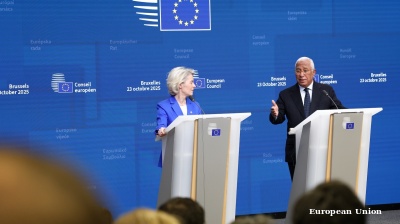Politicians and top private sector leaders met in Switzerland on July 4 to discuss ways to create a new platform that would amount to a “Marshall Plan” for Ukraine’s reconstruction.
“One month ago, a young Ukrainian hero died on the battlefield, as he fought for the future of his country. His name was Roman Ratushnyi, and he would have turned 25 tomorrow. Roman belonged to a new generation of young Ukrainians. As a teenager, he was among the first protesters on the Maidan, demonstrating for Europe and for democracy. And ever since, Roman never stopped fighting for a better Ukraine,” European Commission President Ursula von der Leyen said in her remarks at the opening of the conference. “Roman's life was taken too early, but his dream lives on. The dream of a new Ukraine, not only free, democratic and European, but also green and prosperous. A place that Ukraine's golden generation can finally feel their own. It is this dream that brings us here today.”
Ukraine’s Prime Minister Denys Shmyhal said the cost of reconstruction would run to $750bn and said Russia’s frozen Central Bank of Russia (CBR) reserves and the assets of the oligarchs should be used to fund the programme.
Von der Leyen has earlier suggested that the Russian central bank funds be used to fund reconstruction but has always been careful to add “if possible.”
The problem is that the CBR’s fund have only been frozen and not seized. Technically the money still belongs to the Russian state. Countries cannot simple appropriate the property of another country unless they are at war. And the West and Nato have gone out of their way to say that they are not at war with Russia for fear of reprisals and sparking WWIII.
Experts say that appropriating Russia’s money and assets is a legal minefield and would be difficult to justify in courts. Many of the oligarchs have also challenged sanctions imposed on them as being outside the law and politically motivated.
The amount of damage done to Ukraine by Russia remains a matter of debate. The Kyiv School of Economics (KSE) has estimated the cost of the war so far at $600bn, which includes lost revenue, investment and opportunity costs in addition to the cost of the physical destruction of real estate, infrastructure and other fixed assets worth $104bn, according to KSE.
KSE estimate that at least 45mn square metres of housing, 256 enterprises, 656 medical institutions, and 1,177 educational institutions have been damaged, destroyed or seized.
Former Finance Minister Natalie Jaresko put the figure even higher at $1 trillion.
The amount of money needed for a Marshall Plan is also a matter of debate. The original Marshall Plan to rebuild German after WWII was worth $160bn in today’s dollars, liberal Russian economist and former head of the New Economic School Sergei Guriev told bne IntelliNews in an interview. He and his colleague estimate that Ukraine will need “between $250bn and $500bn” for a modern day Marshall Plan.
“The things that have been destroyed are simply more valuable today than after the war. Technology has come on and it will be more expensive to rebuild,” Guriev told bne IntelliNews on the sidelines of the EBRD annual meeting earlier this year.
Platform for reconstruction
The two-day conference in the picturesque southern Swiss city of Lugano had been planned well before Russia’s invasion and originally was to discuss Ukraine’s reform programme.
The purpose of the conference was not to raise money, but to lay the groundwork for a reconstruction plan, should the situation in Ukraine normalise to the point where work can begin.
“This platform will be the place to shape strategic orientations and priorities for our common work to focus on future-proof reconstruction moving towards climate neutrality, embracing the digital decade, building a social market economy that leaves no one behind, ensuring security and defence, and all of it embedded in good governance,” von der Leyen said. “Ukraine will be in the lead. Because our action will be driven by the aspirations and the desires of the Ukrainian people, that is so important.”
Shmyhal made the trip in person and was accompanied by five other ministers. Foreign Minister Dmytro Kuleba reportedly had to cancel at the last moment due to illness.
All in all, around 1,000 people participated in the conference, including von der Leyen, who has distinguished herself as one of Ukraine’s most ardent and effective supporters in Europe.
Full reconstruction can only begin after the war is over, but Robert Mardini, director-general of the International Committee of the Red Cross, told the RTS broadcaster that some reconstruction work has to begin while the war is still raging to house the displaced and those who have had their homes destroyed.
The effort will require "colossal investments", Zelenskiy acknowledged at the weekend.
MDBs
The Multilateral Development Banks (MDBs) have all rallied to Ukraine’s aid and will be important vehicles of investment and technical assistance.
The European Investment Bank (EIB) has announced the creation of a new EU-Ukraine Gateway Trust Fund to support urgent and long-term investing in Ukraine's reconstruction. Already the EIB has committed €4.7bn for Ukraine’s urgent liquidity needs and support for Ukrainian refugees and more will be made available.
In early March 2022 the EIB deployed €668mn in financing for the Ukrainian government to meet urgent liquidity needs. The EIB also contributed a €4bn credit line for municipalities in Ukraine’s neighbouring EU countries who received refugees. Of the total, €2bn was allocated to Poland, the country with the largest number of refugees from Ukraine.
President of the European Bank for Reconstruction and Development (EBRD) Odile Renaud-Basso was also present and her bank has already started work in Ukraine providing funding and assistance to the early reconstruction work.
Also present were Secretary Generals of the World Health Organization (WHO) Tedros Adhanom Ghebreyesus, the Organisation for Economic Co-operation and Development (OECD) Mathias Cormann and the Council of Europe Marija Pejčinović Burić, who all participated in the Ukraine Recovery Conference.
Ukraine has presented a $750bn rebuilding plan. In Lugano, Switzerland, Ukraine introduced a post-war recovery plan with a cost of more than $750bn on July 4, which will include 850 projects to rebuild the country, announced the Lugano conference’s website.
The program is planned for 10 years, from 2023 to 2032, and will take place in two phases. The first will last from 2023-2025, in which most of the planned projects, 580, are to be implemented. These three years will cost more than $350bn.
The second phase will contain fewer projects but require more financing - more than $400bn. During these ten years, the plan stipulates that the Ukrainian economy will grow by 7% annually. The most expensive programs are:
- the restoration and modernization of housing and the infrastructure in all regions will require $150-$250bn;
- the expansion and integration of logistics with the EU will cost $120-$150bn;
- providing for energy independence and the green conversion will cost $150bn;
- macro-financial stability will require $60–$80bn;
- ensuring competitive access to capital requires $75bn;
- developing value-added sectors of the economy will cost $50bn; and
- spending in the defence sector will total $50bn.
News

Bill Gates makes surprise Indian TV debut
In a move set to spark both intrigue and curiosity, Microsoft co-founder and philanthropist Bill Gates has made a cameo appearance on Indian television, entering the iconic drama series Kyunki Saas Bhi Kabhi Bahu Thi 2.

Queen Sirikit of Thailand dies
The death of Queen Sirikit of Thailand has marked the end of an era for the Thai monarchy. According to an official statement from the Bureau of the Royal Household of Thailand, Her Majesty died at 9.21 pm on October 24.

Pakistan, the latest in Asia to see gold prices plummet
In international trading, the precious metal lost $35 per ounce to settle around $4,115, extending a week-long slide triggered by shifting expectations over US monetary policy.
_1761305900.jpg)
Latin America edges up growth forecasts but remains trapped in low gear, ECLAC says
Latin America and the Caribbean will expand 2.4% this year, the Economic Commission for Latin America and the Caribbean said, marking the second upward revision since April but pointing to the region's struggle to escape chronically weak growth.




